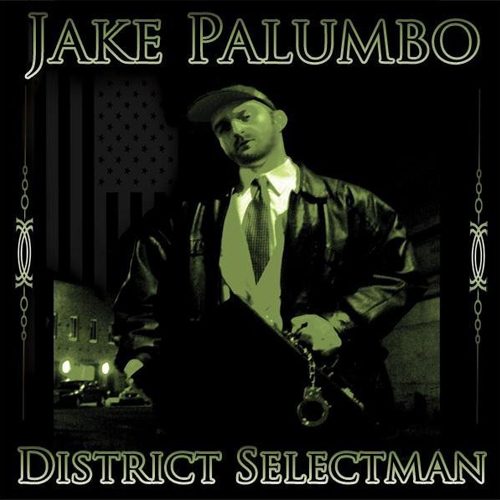Jake Palumbo (and his persona) is the classic ‘faceless’ rapper, a self-conscious product of the underground – a few good ideas, some execution, but no distinctive flow, production, or lyrics – nothing but rehashed quality. ‘Rehashed’? – yes, as even good material is not always original. At most, it’s solid:
“Get schooled, and wonder why your life’s dull
wanna battle gutter for gutter
I’ve smoked meth out of a light bulb
I might blow, cause I’m the champion
you couldn’t sleep more with a handful of Ambien”
No, Palumbo (and others!) will not be recalled with a cringe, or used a century from now, if ever, as evidence of cultural stagnation – we’ll leave such unrecommended honors to the downright bad, such as 50 Cent, or well-meaning frauds with tricky shadows, such as Dead Prez, Necro, Busdriver, and everything in between. Oh well, Palumbo’ll warrant a smile, although I don’t smile at Ras Kass, nor El-P: there, I let my hairs rise, something the merely ‘good’ can’t do, limitations being what they are. Still, the good can show how to get ideas, play with them, and produce a solid effort from incongruous parts. In brief, Art – even if it’s often uninspired.
“District Salesman” fits that category, for several reasons. I’ve outlined the general problems, above, but, to get to specifics… Palumbo produces the entire album. Most rappers can’t pull that off, but here, the production is often good, but sometimes slightly less than solid – in brief, the rapping is usually better than the performances. “Civilized Society,” the first track, begins inauspiciously, as a warped, high-pitched voice recites the Pledge of Allegiance. No matter the intent, the sum, which actually counts, is off – if Palumbo is ‘serious,’ reciting the Pledge for patriotic reasons (and he isn’t), the warp is unnecessary, a technical throwaway in context, and bad-sounding on its own; if Palumbo is critical, the sentiment (and execution) is dull and clichéd. So, it’s unflattering both ways. And, how many times has the Pledge motif been used as a symbol for nationalism, or irony? – in political speeches? – in art, in sound bites, or whatever? It’s – that is, the concept – hard to listen to, even if some occasional ‘twist’ is thrown in to make it more palatable. And, unless you’re especially skilled at flipping the banal, it’s a hard risk to recommend.
So, you get the repetition, and Palumbo gets the serenity of never straying from his comforts. In the same track, another mechanical voice offers an introduction to “District Selectman,” no so much to the album, but the persona: a vaguely political, arrogant, but talented human being offering the ‘new’ to rap, even though it’s not so easy to distinguish him, in persona, skill, and substance, from many other merely ‘good’ musicians. But, Palumbo has been called a mix of ‘gangster’ and ‘nerd’ – a twist, a kind of stipulation? I think not, since I don’t see it – sure, he has threats, irreverence, and so on, but so does almost any other rapper imaginable.
In “Shoot Interview,” Palumbo throws a better, more creative flow, bouncy to the track’s vocal sample and drum-driven production, and offers bragging along the lines of the first track. “Computer (Skit)” is pretty worthless, while “Burt Reynolds” is another confident bit of braggadocio against some basic but well-placed guitar chords, with good verses. “Organ Donation” has almost no production to speak of, but is funny, playing up to Palumbo’s persona as a District Selectman, or ghetto, or neighborhood, mayor, or gubernator, or something, along a bunch of sex lyrics. But, ah – as before, the limitations of Palumbo and the product! To compare with something tangible and instructive, Louis Logic does the sex raps better, for two reasons. First, they are much better crafted for humor as well as poignancy, a technical feat that can easily get tired. Second, they are, despite their childishness, often quite substantive, or at least attempt at being philosophical. But, here – it’s merely fun, and that’s all. It’s entertaining, but not always artistic.
“People In Your Neighborhood” features a pretty well-chosen sample, the title, from, perhaps, a children’s show, in sing-song refrain. Palumbo goes on to describe the drug addicts, dealers, Russian gangsters, etc., throughout Tennessee and Brooklyn, which, like above, is entertainment. But, anything below it all – any commentary, twist, etc., beyond the immediate aesthetic gratification? No, but it’s still good, from technical standpoint. As if to offer contrast, “Thank You For Not Choking” raises the bar a bit – a concept track, with an introspective bent, which features some haunting lines, including the excellent:
“On the topic of questions and answers
I’m sad that the facts say it is colon cancer
No one asked ya, I’m used to bad news
At least I had the chance of going out like Zappa”
In “Box Cover,” the subtle, metallic ringing congruent to the sleazy lyrics, and quotes spliced from similarly jolly ‘films.’ The chorus, sung, has a nice, humorous touch to cut the creepy tension, but, compared to the above, its limits are too obvious. “Shift Change” is better, a clever attack on 9-5’s, and the rest does not dip into banality. A pretty finished product, but nothing too satisfying – there’s always more that could have been done.

